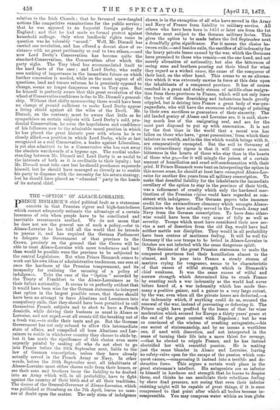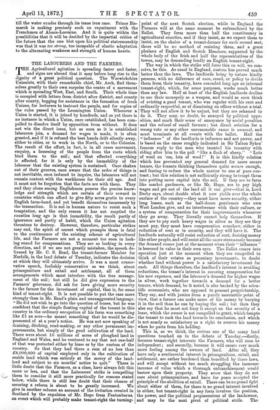THE "OPTION" OF ALSACE-LORRAINE.
pRINCE BISMARCK'S chief political fault as a statesman consists in that Prussian rigour and high-handedness which cannot adequately estimate the advantage of a certain
looseness of rein when people have to be conciliated and inevitable resentments soothed. We do not mean that he does not see the general use of such a policy,—for in Alsace-Lorraine he has told all the world that he intends to pursue it, and has required the German Parliament to delegate the Government of that province to the Crown, precisely on the ground that the Crown will be able to treat Alsace-Lorraine with more tenderness and tact than would be possible were the province to be subjected to the central Legislature. But when Prince Bismarck comes to work out his own ideas of administrative tenderness, one sees at once the hardness of the Prussian temperament, and its incapacity for realising the meaning of a policy of indulgence. Take the case of the " Option " accorded by the Treaty of Frankfort to the Alsace-Lorrainers as to their future nationality. It seems to us perfectly evident that it would have been wise for the German statesmen to interpret that option in the largest possible sense, that there should have been no attempt to force Alsatians and Lorrainers into compulsory exile, that they should have been permitted to call themselves French subjects and to elect to have a French domicile, while driving their business as usual in Alsace or Lorraine, and not urged,—at all events till the breaking out of a fresh war,—to strike their tents and go. But the German Government has not only refused to allow this intermediate state of affairs, and compelled all born Alsatians and Lor- rainers to reside in whichever country they choose to abide by, but it has made the significance of this choice even more urgently painful by making all who do not elect to go into France before the 30th September next, liable to the law of German conscription, unless they have already actually served in the French Army or Navy. In other words, before the 30th September next, all inhabitants of Alsace-Lorraine must either choose exile from their homes, or see their sons and brothers incur the liability to be drafted into an Army which will, in all probability, have to fight against the country of their birth and of all their traditions. The decree of the General-Governor of Alsace-Lorraine, which was published at Strasburg on the 7th April, leaves no man- ner of doubt upon the matter. The only atom of indulgence
shown is in the exemption of all who have served in the Army and Navy of France from liability to military service. All others who have been born in 1851 or later are from the 1st October next subject to the German military levies. This gives the option to be made before the 3rd September next a dreadfully grim significance. For it means the choice be- tween exile,—and besides exile, the sacrifice of all indemnity for the heavy private losses caused by the war, which the Germans have promised to those who remain—on the one hand, and not merely alienation of nationality, but also the bitterness of seeing sons and brothers pouring out their blood for what they regard as a wicked cause, the cause of the conqueror of their land, on the other hand. This seems to us an alterna- tive which it was extremely unwise to force at this date upon the inhabitants of a conquered province. It has of course resulted in a great and steady stream of middle-class emigra- tion from these provinces to France, which will not only leave the trade of these flourishing and industrious lands greatly crippled, but is driving into France a great body of war-pro- pagandists, who will have the enormous advantage of pointing to their own sacrifices as guarantees of their sincerity. The old landed gentry of Alsace and Lorraine are, it is said, show- ing much less of the emigrating zeal, and are for the most part disposed to put up with annexation. It is not for the first time in the world that a moral woe has fallen on those who have, great possessions,' from which their inferiors in wealth, and in the ties which wealth brings with it, are comparatively exempted. But the evil to Germany of this extraordinary rigour is that it will create even more bitterness in the hearts of those who stay than in the hearts of those who go,—for it will mingle the poison of a certain amount of humiliation and cruel self-condemnation with their grief. If Prince Bismarck were bent on interpreting the option in this severe sense, he should at least have exempted Alsace-Lor- raine for another five years from all military conscription. To make that dreadful liability for the inhabitants the immediate corollary of the option to stay in the province of their birth, was a refinement of cruelty which only the hardened mar- tinetism of the Prussian regime could have regarded as con- sistent with indulgence. The German papers take immense credit for the extraordinary clemency which exempts Alsace- Lorrainers who have actually served in the French Army and Navy from the German conscription. To have done other- wise would have been the very acme of folly as well as severity. Troops which must have considered their new ser- vice a sort of desertion from the old flag, would have had neither mettle nor discipline. They would in all probability have been centres of mutinous feeling. It will be well for Germany if the new troops to be levied in Alsace-Lorraine in October are not infected with the same dangerous spirit.
This decision of the great Prussian statesman to make the conquered provinces feel their humiliation almost to the utmost, and to pour into France a steady stream of martyrs crying for vengeance, seems to be characteristic of that excess of wilful strength which is Bismarck's chief weakness. It was the same excess of wilful and narrow strength which determined him to crush France by exacting such a war indemnity as the world had never before heard of, a war indemnity which has made Ger- many a positive gainer, and a gainer to a very large extent, by the war, even when all the private losses are deducted,—a war indemnity which, if anything could do so, secured the renewal of the war, instead of preventing or deferring it. The Prince might have profited by the lesson of that far wiser moderation which secured for Europe a thirty years' peace at the end of the great contest with Napoleon ; but he was so convinced of the wisdom of crushing antagonists,—his one secret of statesmanship, and by no means a worthless one, if used with discretion, and not interpreted in the sense of turning their life into a mere thirst for revenge, —that he elected to cripple France, and he has instead electrified her with resentful passion. He is making just the same blunder in Alsace and Lorraine, leaving no safety-valve open for the escape of the passion which con- quest causes,—compressing it instead into a terrible and de- structive force. This argues a certain weak place in the great statesman's intellect. His antagonists are so inferior to himself in hardness and strength that he learns to despise them, and thinks he can annihilate their rebellious feeling by sheer dead pressure, not seeing that even their inferior resisting might will be capable of great things, if it is once compressed to that point after which all bodies become in- compressible. You may compress water within an iron globe
till the water exudes through its tense iron case. Prince Bis- marck is making precisely such an experiment with the Frenchmen of Alsace-Lorraine. And it is quite within the possibilities that it will be decided by the impartial critics of the future that the one blot upon his political statesmanship was that it was too strong, too incapable of elastic adaptation to the alternating weakness and strength of human hearts.



































 Previous page
Previous page